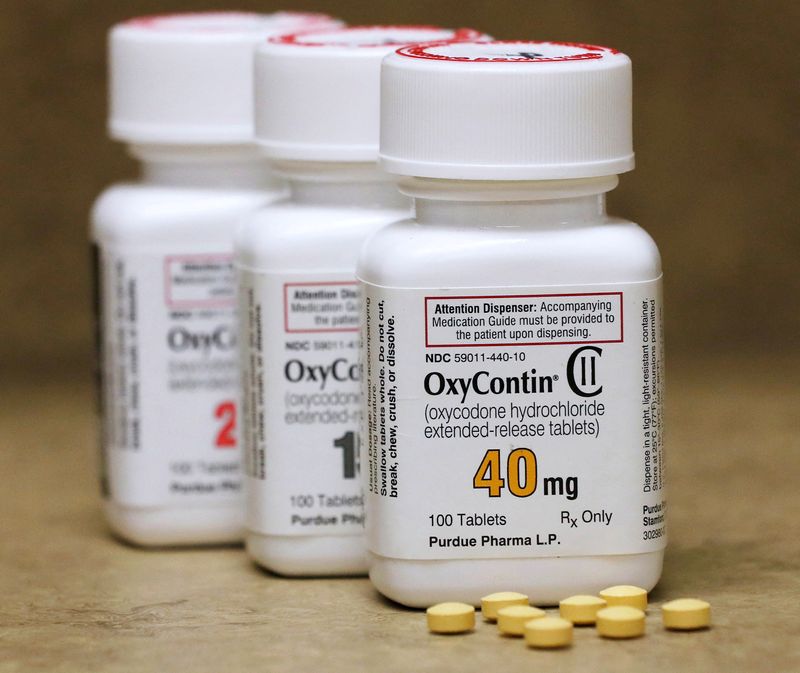By Dietrich Knauth
NEW YORK (Reuters) - Bankrupt OxyContin maker Purdue Pharma can shield its owners, members of the wealthy Sackler family, from opioid lawsuits in exchange for a $6 billion contribution to the company's broader bankruptcy settlement, a U.S. appeals court ruled on Tuesday.
The New York-based 2nd U.S. Circuit Court of Appeals said that U.S. bankruptcy law allows legal protections for non-bankrupt parties, like the Sacklers, in extraordinary circumstances.
In a majority opinion written by 2nd Circuit Judge Eunice Lee, the court ruled that the legal claims against Purdue were inextricably linked to claims against its owners, and allowing lawsuits to continue targeting the Sacklers would undermine Purdue's efforts to reach a bankruptcy settlement.
Judge Richard Wesley wrote a separate opinion "reluctantly" agreeing that protections for the Sacklers were legal, based on the court's past decisions. But U.S. bankruptcy law does not explicitly allow courts to wipe away lawsuits against non-debtors like the Sacklers, and Congress or the U.S. Supreme Court should step in to clarify an issue that has divided courts across the U.S., Wesley wrote.
Purdue has sought to use its bankruptcy case to resolve thousands of lawsuits, many filed by state and local governments, alleging that OxyContin helped kickstart an opioid epidemic that caused more than 500,000 U.S. overdose deaths over two decades.
Purdue has pleaded guilty to charges related to its opioid marketing, while its owners have expressed regret but denied wrongdoing.
The Sackler family members have agreed to contribute up to $6 billion to a trust that will be used to pay the claims of states, victims of addiction, hospitals and others who have sued Purdue over its misleading marketing of OxyContin.
In exchange, the Sacklers will receive broad legal protection from lawsuits related to the opioid crisis.
The families of the late Mortimer Sackler and the late Raymond Sackler said in a joint statement that they looked forward to moving ahead after the lengthy wait for a 2nd Circuit decision.
"The Sackler families believe the long-awaited implementation of this resolution is critical to providing substantial resources for people and communities in need," the families said.
The Sackler contribution accounts for most of the cash payment in a broader bankruptcy settlement that Purdue values at more than $10 billion.
A federal judge blocked that settlement in December 2021, ruling that it could not protect the Sackler family members from lawsuits because they were not bankrupt themselves, leading to Purdue's appeal to the 2nd Circuit.
With the appeal concluded, Purdue will now return to court to seek final approval of the settlement and end its long-running Chapter 11 bankruptcy.
"Our focus going forward is to deliver billions of dollars of value for victim compensation, opioid crisis abatement, and overdose rescue medicines," Purdue said in a statement.
In addition to the Sackler payment, Purdue will pay an additional $1.4 billion in opioid settlements, contribute "substantial" additional insurance recoveries, and restructure itself into a new company committed to developing and distributing overdose reversal and addiction treatment medicines for no profit.
U.S. overdose deaths have accelerated in recent years, with more than 100,000 in 2021, over 75% of which involved an opioid drug, according to the U.S. Centers for Disease Control and Prevention.

The lawsuits against Purdue allege that the drugmaker misled doctors about how addictive OxyContin was, causing many patients to become hooked on opioids. Many of those patients later turned to illegal drugs like heroin, sometimes laced with dangerously potent fentanyl, causing even wider damage, according to the lawsuits.
Similar lawsuits related to the U.S. opioid crisis have resulted in more than $50 billion in settlements with opioid manufacturers, drug distributors and pharmacy chains.